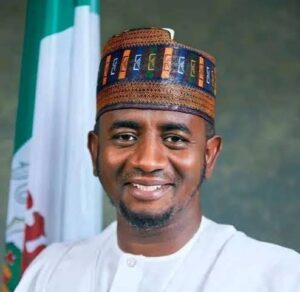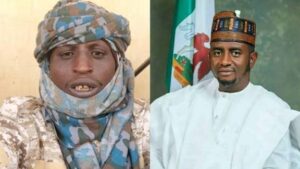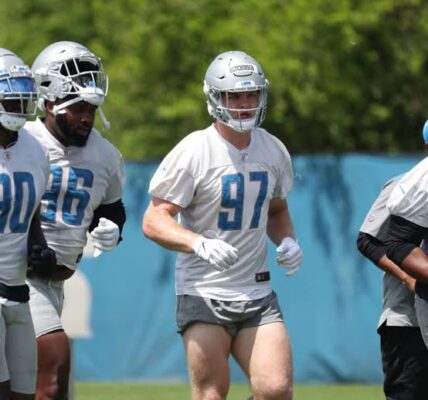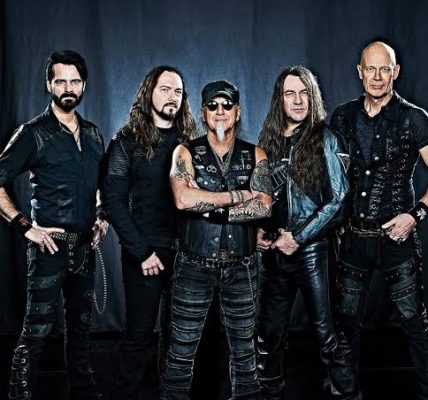Skip to content
Nigerian Senator Shehu Buba Faces Backlash Over Alleged Ties To Terror Kingpin Bello Turji, Church Demolition For Mosque Project.

By Sahara Reporters
Nigerian Senator Shehu Buba is currently under intense public scrutiny following allegations linking him to notorious terror kingpin Bello Turji, as well as his involvement in the controversial demolition of a church to make way for a mosque project.
The developments have sparked widespread outrage from both religious communities and political observers, raising serious questions about the senator’s conduct and his impact on interfaith relations in Nigeria.
Alleged Ties To Terror Kingpin Bello Turji
Bello Turji, one of Nigeria’s most wanted terrorists, has been responsible for a series of violent attacks, primarily in the northern regions of the country.

Turji’s name is synonymous with terror, kidnapping, and destruction, and his influence extends through several militant groups operating under the guise of ethno-religious conflicts.
Recent reports from security sources allege that Senator Shehu Buba has maintained covert connections with Bello Turji.
While the senator has vehemently denied any association with the terror group, several insiders and local informants claim that Buba has provided logistical and financial support to Turji’s operations.
These allegations have not only tarnished Buba’s reputation but have also cast a shadow over his political career.

Security analysts caution that if these ties are proven, it could implicate the senator in aiding terrorist activities, thereby complicating Nigeria’s already fragile security landscape.
The Senate has been called upon to investigate these claims thoroughly to ensure that no member of the legislative body is complicit in the rise of violent extremism.
The Church Demolition Controversy
Adding fuel to the fire, Senator Buba is also facing criticism for the demolition of a historic church to clear the land for a mosque construction project.
The incident took place in Buba’s home constituency, where residents reported that the demolition was carried out abruptly without proper consultation or adequate compensation to the affected congregation.

The church, which had served the local Christian community for decades, was reportedly razed overnight, sparking outrage and protests from religious leaders, community members, and human rights activists.
Critics accuse Senator Buba of promoting religious intolerance and using his political influence to favor one religious group over another.
Religious harmony is a delicate issue in Nigeria, a country with significant Muslim and Christian populations.
Any perceived bias or disrespect towards a religious community risks igniting tensions that could escalate into violence.
Many Nigerians have expressed concern that such actions undermine national unity and the principles of religious freedom enshrined in the country’s constitution.
Political Reactions and Public Outcry
The backlash against Senator Shehu Buba has been swift and vociferous.
Opposition politicians have seized the opportunity to question his integrity and call for his resignation pending a full investigation into the allegations against him.
Civil society organizations have also condemned the demolition, describing it as a blatant disregard for due process and religious rights.
In a recent press conference, the Christian Association of Nigeria (CAN) issued a statement demanding accountability and justice for the affected congregation.
They called on the federal government to intervene and protect the rights of all religious groups, emphasizing the need for peaceful coexistence and mutual respect among Nigeria’s diverse populations.
Meanwhile, some Muslim groups have defended the mosque project, arguing that it serves the needs of the local Muslim community and contributes to religious development in the area.
However, most agree that the demolition should have followed proper legal channels and involved community dialogue to prevent unnecessary conflict.
Senator Shehu Buba’s Response
Senator Buba has publicly denied all allegations linking him to Bello Turji and the terrorist network.
In a recent statement, he condemned the accusations as politically motivated attempts to smear his reputation and destabilize his constituency.
Regarding the church demolition, Buba asserted that the mosque project was a legitimate community development initiative aimed at fostering religious inclusivity.
He further claimed that the church building was structurally unsound and that the decision to demolish it was taken after consultations with local leaders.
Buba pledged to work towards rebuilding trust among all religious groups in his constituency and emphasized his commitment to peace and security.
The Need for Transparent Investigations
Given the gravity of the allegations, calls for transparent and impartial investigations have intensified.
Experts highlight that resolving these issues requires a thorough examination of evidence, including financial records, communications, and testimonies from credible witnesses.
Nigeria’s security agencies and anti-corruption bodies must collaborate to determine the extent of any illicit ties between politicians and terror groups.
Similarly, local authorities need to review the processes behind the church demolition to ensure that legal procedures were followed and that victims receive appropriate redress.
Broader Implications for Nigeria
The controversies surrounding Senator Shehu Buba spotlight broader challenges facing Nigeria, including political accountability, religious coexistence, and the fight against terrorism.
Nigeria’s socio-political fabric is deeply intertwined with its religious and ethnic diversity, making any breach of trust potentially destabilizing.
As the nation grapples with insurgencies and communal conflicts, leaders are expected to act responsibly and uphold the values of democracy and human rights.
The situation with Senator Buba serves as a reminder of the urgent need for vigilance, transparency, and inclusive governance to prevent the exploitation of religion and violence for political gain.
Senator Shehu Buba’s alleged ties to terror kingpin Bello Turji and the contentious church demolition have placed him at the center of a storm of criticism.
While investigations are still ongoing, the incident underscores the fragile nature of Nigeria’s inter-religious relations and the critical importance of ethical leadership.
As Nigerians await the outcomes of official inquiries, many hope that justice, peace, and unity will prevail over division and suspicion.








